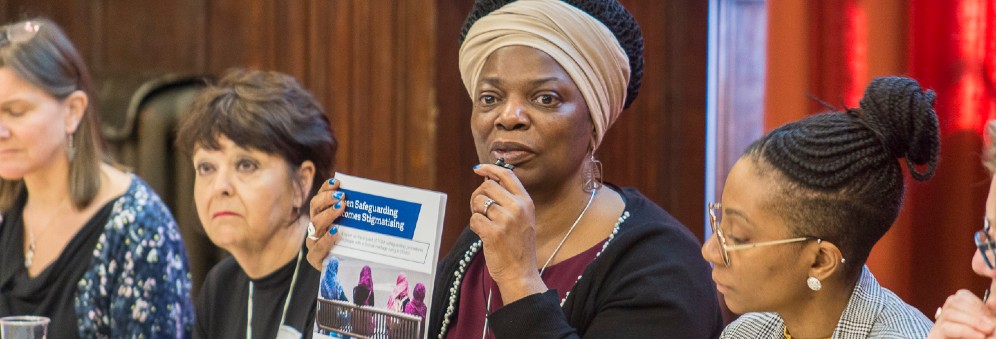FGM-safeguarding and race inequality
Improving policy responses to FGM-safeguarding and race inequality through co-produced knowledge.
FGM-safeguarding and migrant-citizenship
Female Genital Mutilation (FGM) is considered by the UN to be a ‘global concern’. It is frequently claimed that ‘tens of thousands’ of girls are at risk in the UK. The government has responded with stringent legislative and policy measures, which have been implemented without substantial evidence regarding either the level of risk or the potential impact of such approaches on those targeted by the legislation and policy.
Our first report When Safeguarding becomes Stigmatised, based on research funded by the Faculty of Social Sciences and Law, University of Bristol, finds that FGM-safeguarding has been experienced as stigmatising, exploitative and unjustified, and as an assault on belonging and citizenship. The report highlights the ineffectiveness and negative impact of national policy as well as valuable opportunities for policymakers and other professionals to improve approaches to FGM-safeguarding in schools, healthcare settings, and by social services and the police.
Our second report (coming soon) systemically reviews available data from which FGM prevalence levels might be established. Despite serious inadequacies in the data available, there is sufficient evidence to indicate that the risk among those living in the UK is far lower than often suggested, with the numbers of girls affected likely to be in the tens rather than the tens of thousands. This research was funded by the Elizabeth Blackwell Institute, University of Bristol and the Wellcome Trust Institutional Strategic Support Fund.
Our launch event for the first report attracted 80 delegates including the Deputy Mayor, and those working in healthcare, education, the police, academics, activists and journalists. There was positive discussion of ways in which this research could help support the development of more inclusive and effective policy and practice. The introduction of more appropriate FGM-safeguarding approaches have led to a decline in referrals. We have also given evidence to the Scottish Executive on their recent FGM (Protection and Guidance) Bill. We are part of the International Research Council on Genital Cutting Practices and will be meeting with colleagues in Sweden in June 2022 (rescheduled since 2020) to discuss global responses to FGM.
Research Action Coalition for Race Equality
Saffron Karlsen and other University of Bristol colleagues have established the Research Action Coalition for Race Equality (RACE), RACE a unique partnership between the University of Bristol and Black South West Network and involves working with key strategic partners including the Commission on Race Equality, Bristol City Council, third-sector Race Equality organisations and others committed to the elimination of race inequality in Bristol and the South West.
RACE aims to connect research and data to community-led approaches, in ways that recognise, value and respond to communities’ lived experiences and diverse forms of knowledge and expertise, through partnership, collaboration and co-production between academics, community groups and policy-makers.
The overarching aim of the network is to co-produce knowledge regarding the presence and drivers of race inequality in the region and to ensure effective policy responses to these: through engagement with a diverse range of stakeholders, including those from disadvantaged groups, third-sector organisations, policy-makers and business leaders as well as academics from across the University.
A key aim of the research is addressing gaps in the regional data on ethnic inequalities. Recent research, funded by SPAIS’ Centre for Ethnicity and Citizenship, explored the regional data available via the Government's Race Disparity Audit. This has highlighted the limited data currently available and also the problems affecting much of that. The Cabinet Office is currently responding to our recommendations from this work. Current research involves similar investigation of data held by the West of England Combined Authority, Bristol City Council, Office for National Statistics and Department of Work and Pensions.
We are also currently mapping the race equality initiatives taking place in the city. This will involve addressing evidence gaps regarding which organisations are involved in race equality initiatives, details of these initiatives and their data and evaluation needs. It will also enable us to identify how best to support this on-going work. This work is being conducted by undergraduate students on placements with BSWN, funded by the Office for Students through the Professional Liaison Network at the University of Bristol. It will provide important data from which to develop and evaluate the impact of policy designed to address this.
Following our successful visioning workshop in January, funded by the IAA, we will have a wider listening and launch event in June, funded through the UKRI QR SPF scheme. This will explore in more detail the perspectives of local activists and policy-makers regarding opportunities for BREN to help redress the power imbalances in the production and utilisation of data on race disparities in the region. We also presented to the Race Equality Strategic Leaders’ Group, led by Bristol City Council, in May.
